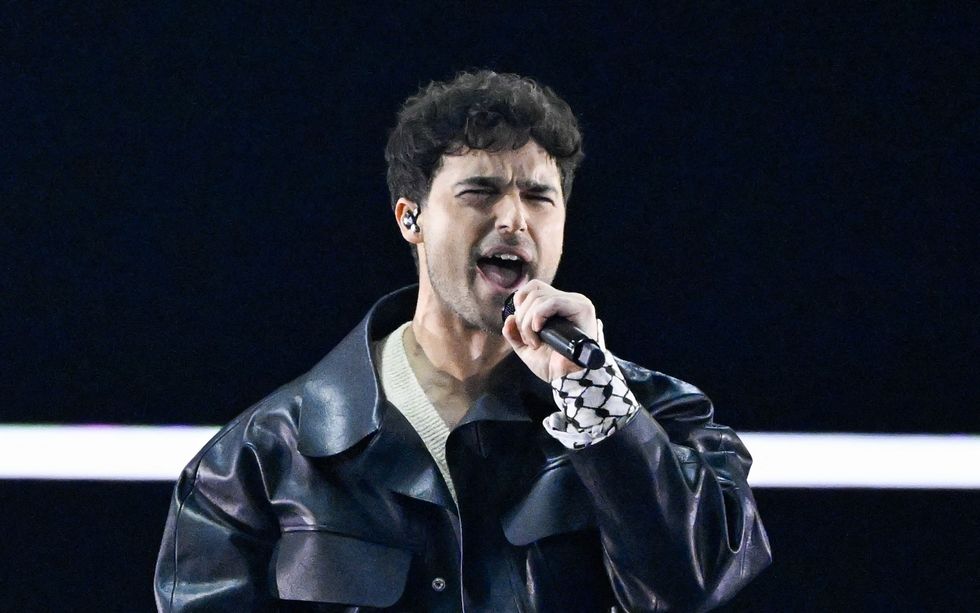WATCH HERE: Eurovision hosts listen to this year's UK entry song
INSTAGRAM
The EBU has changed its policy after many controversies last year
Don't Miss
Most Read
Trending on GB News
The European Broadcasting Union has updated its flag policy for Eurovision 2025, allowing audience members to display Palestinian flags while restricting performers to national flags only.
The revised rules, revealed through leaked documents obtained by Denmark's national broadcaster, permit spectators to wave any "legally permitted" flags during the contest in Switzerland.
Meanwhile, performers face stricter regulations as the EBU struggles to maintain political neutrality, with singers are now being banned from displaying any flag except their national banner during performances or official events.
This prohibition extends to LGBTQ+ pride flags, Palestinian flags and EU flags, sparking criticism from advocacy groups, with the changes following controversy at previous contests where flag displays became politically charged.
The new policy will allow fans to display any flag at Eurovision's 2025 final in St Jakobshalle, Switzerland, on Saturday, May 17, provided it complies with certain restrictions.
Flags that incite hatred or violence, offensive or defamatory banners, and symbols of banned terrorist groups such as Hamas remain prohibited, opening the door for audience members to wave Palestinian flags during the competition.

The EBU have lifted the ban on Palestinian flags at this years contest
EBU
LATEST DEVELOPMENTS
The decision comes as Eurovision faces ongoing tension over its non-political stance, with some calling for Israel to be removed from the programme over the war in Gaza.
The EBU's flag ban for performers will apply on stage, in the fan zone, green room, and official areas where contestants wait for scores, with Dutch broadcaster AVROTROS confirming the policy aims to keep the contest non-political.
"A rainbow flag is not a political statement. But the EBU wants to draw a clear line, and that is their reasoning for the decision," a representative from AVROTROS told NL Times.
The broadcaster clarified that during official moments, such as when participants are introduced on stage, only the flag of the country they represent should be displayed.

Eric Saade caused controversy last year by wearing a Keffiyeh scarf
BBC/GETTY
LGBTQ+ advocacy group COC has criticised the decision, arguing that the rainbow flag represents personal identity rather than a political statement.
"We want to have a conversation with AVROTROS. We consider AVROTROS a strong ally of the LGBTQ+ community, and we are confident that we can convince them that expressing who you are is not a political statement, especially for an artist," a COC spokesperson told ANP.
COC Nederland described the ban as "absolutely ridiculous" and added: "Banning a pride flag is like forbidding participants from holding hands with their same-sex partner or claiming that a kiss between two people of the same gender is a political statement."
AVROTROS has expressed willingness to engage in dialogue with COC over the issue; however, this is not the first time Eurovision has restricted flag displays, as during the 2024 contest in Malmö, Palestinian flags were banned from the arena.
Swedish pop star Eric Saade circumvented the rule by wearing a Keffiyeh scarf, a symbol of pro-Palestinian support, on his wrist during the semi-finals.
The EBU faced accusations of muting audience booing during Israeli entrant Eden Golan's performance of "Hurricane".
In 2016, the EBU's flag policy was even more restrictive, banning not only Palestinian and Isil flags but also the Welsh flag and Scottish saltire.
Israel will be represented at Eurovision 2025 by Yuval Raphael, a survivor of the Nova music festival attack, and will perform a song titled "New Day Will Rise".
Pride flags and EU flags have historically been common sights in the Eurovision audience.
Last year's British entry, Olly Alexander, expressed an "ambivalent" relationship with the Union flag, describing it as potentially "divisive" and "nationalistic".








